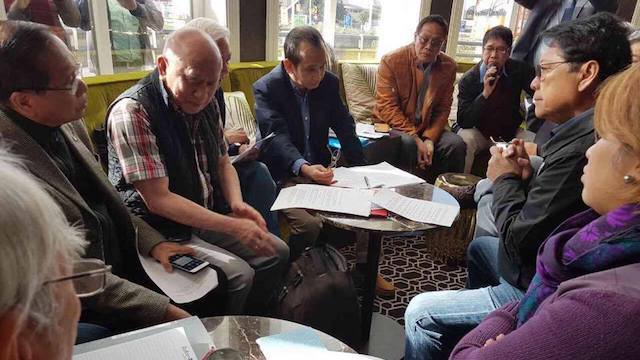Communist rebels say they will only agree to implement an interim joint ceasefire after talks on the Comprehensive Agreement on Socio-Economic Reforms are completed

PEACE TALKS. The Philippine government and the National Democratic Front hold the 4th round of talks in the Netherlands. Photo courtesy of Raul Francia/OPAPP
The government and communist rebels buckled down to work on resolving the root cause of the armed struggle in the Philippines – land distribution – before the formal talks in the Netherlands closed on Thursday, April 6.
The two parties committed to fast-track talks on land distribution especially because the rebels maintained that they will only agree to implement an interim joint ceasefire after the issue is resolved. The goal is to finish the talks within the year.
They returned each other's draft proposals on how to implement free land distribution, an agreement forged during the 3rd round of talks in January, where the government commits to shoulder the costs.
The parties pointed out in color-coded matrices the provisions they found contentious.
They will continue the difficult talks in at least 6 meetings they agreed to hold in the Philippines in the succeeding weeks to make headway in addressing each other's concerns before the 5th round of talks scheduled from May 26 to June 2.
The two parties "firmed up their agreement on distribution of land for free as the basic principle of genuine land reform," they said in a joint statement signed during the closing ceremony on Thursday.
But how they will implement free land distribution is the crux of the entire peace process. Based on government estimates, completing land distribution will cost the government up to P98 billion.
Land distribution is the meat of talks on a Comprehensive Agreement on Socio-Economic Reforms (CASER) headed by former agrarian reform secretary Hernani Braganza for the government, and Juliet Sison for the National Democratic Front (NDF).
They call CASER the "heart and soul" of the peace process because it aims to address the roots of the armed struggle.
Braganza said the agreement should be realistic and time-bound.
It is the 2nd of the 4 main agenda in the peace talks to end the longest-running communist insurgency in Asia.
The first agenda, the Comperehensive Agreement on Respect for Human Rights and International Humanitarian Law (CARHIHL), was signed in 1995. The panels have been stuck on CASER for years.
The two other agenda before a final peace deal is reached are the Comprehensive Agreement on Political Reforms (CAPR) and the Comprehensive Agreement on End of Hostilities and Disposition of Forces (CAEHDF).
The negotiators held the 4th round of talks after a 5-week impasse that followed the rebels' move to withdraw their unilateral ceasefire declaration, which prompted President Rodrigo Duterte to scrap the talks.
Duterte was later persuaded to reopen the talks but he set conditions, including the adoption of a more stable joint ceasefire arrangement.
Discussions on a joint ceasefire agreement dominated the latest round of negotiations.
http://www.rappler.com/nation/166302-philippines-agrarian-reform-communist-rebels

No comments:
Post a Comment
Note: Only a member of this blog may post a comment.